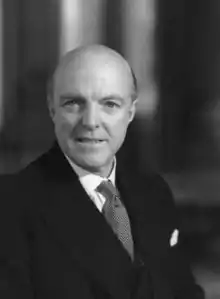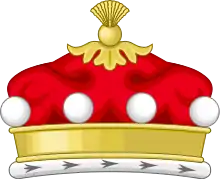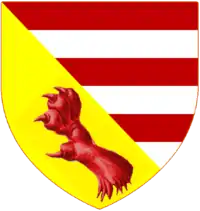Harold Caccia, Baron Caccia
Harold Anthony Caccia, Baron Caccia, GCMG, GCVO (21 December 1905 Pachmarhi, India – 31 October 1990 Builth Wells, Wales) was a British diplomat.

The Lord Caccia GCMG GCVO | |
|---|---|
 Caccia in 1962 | |
| Permanent Under-Secretary of State for Foreign Affairs | |
| In office 1962–1965 | |
| Foreign Secretary | Home, Butler, Gordon Walker, Stewart |
| Preceded by | Sir Frederick Millar |
| Succeeded by | Sir Paul Gore-Booth |
| Personal details | |
| Born | 21 December 1905 |
| Died | 31 October 1990 (aged 84) |
He was educated at Summer Fields School,[1] Eton College and Trinity College, Oxford and won a Blue at rugby union, playing at centre for Oxford in the Varsity match in 1926.[2] He played cricket for Oxfordshire in the Minor Counties Championship between 1928 and 1938.[3] In 1932 he married Anne Catherine Barstow, daughter of Sir George Barstow and Enid Lillian Lawrence.
Caccia entered the diplomatic service in 1929 and was posted to Peking and then to Athens and London where, in 1936, he became assistant private secretary to Anthony Eden. He was back in Athens early in World War II, but was then attached to the staff of Harold Macmillan, Britain's representative at Allied headquarters in North Africa. The Greek Civil War once again saw him in that country, and by 1945 his services earned him recognition on the Birthday Honours List.
Caccia was Ambassador to Austria from 1951 to 1954, and from 1956 to 1961 Ambassador to the United States. He was sent to Washington to repair relations badly damaged by the Suez crisis of 1956. The breakdown in mutual confidence arose when Britain and France joined an Israeli invasion of Egypt and sent military forces to capture the Suez Canal, which had been nationalised by President Gamal Abdel Nasser of Egypt. In the years that followed, he was instrumental in restoring and nurturing the "special relationship" between London and Washington.[4]
His daughter Clarissa married David Pryce-Jones, son of Alan Pryce-Jones and Thérèse Fould-Springer ("Poppy").[5]
In 1961, he became Permanent Under-Secretary of State, an office he held until 1965. He was Provost of Eton 1965-78 and President of the Marylebone Cricket Club (MCC) in 1973–74.
He was knighted in 1950, and was created a life peer with the title Baron Caccia, of Abernant in the County of Brecknock, on 11 May 1965.[6][7] Caccia was appointed a Bailiff Grand Cross and Lord Prior of the Order of the Hospital of St John of Jerusalem, a Knight Grand Cross of the Royal Victorian Order and a Knight Grand Cross of the Order of St Michael and St George. Lord Caccia was a Knight of the International Order of St. Hubertus.
  |
|
Notes
- Usborne, Richard (1964). A Century of Summer Fields. Methuen. p. 139.
- Rothmans Rugby Union Yearbook 1991-92. Queen Anne Press. 1991. p. 414. ISBN 0356202496.
- "Player profile: Harold Caccia, Baron Caccia". CricketArchive. Retrieved 24 May 2011.
- "Harold Anthony Caccia". Oxford Dictionary of National Biography. 2004. Retrieved 10 November 2015.
- "'Musical' Men And Money | Standpoint". standpointmag.co.uk. Retrieved 14 April 2018.
- "No. 43648". The London Gazette. 11 May 1965. p. 4573.
- "No. 43654". The London Gazette. 18 May 1965. p. 4861.
- http://www.cracroftspeerage.co.uk/online/content/lp1958%20c.htm
References
- "p. 19109 § 191090". Retrieved 19 October 2006.
| Diplomatic posts | ||
|---|---|---|
| Preceded by Bertram Jerram |
British Ambassador to Austria 1951–1954 |
Succeeded by Geoffrey Wallinger |
| Preceded by Roger Makins |
British Ambassador to the United States 1956–1961 |
Succeeded by David Ormsby-Gore |
| Government offices | ||
| Preceded by Sir Frederick Hoyer Millar |
Permanent Under-Secretary of State for Foreign Affairs 1962–1965 |
Succeeded by Sir Paul Gore-Booth |
| Academic offices | ||
| Preceded by Claude Aurelius Elliott |
Provost of Eton 1965–1978 |
Succeeded by Martin Charteris |